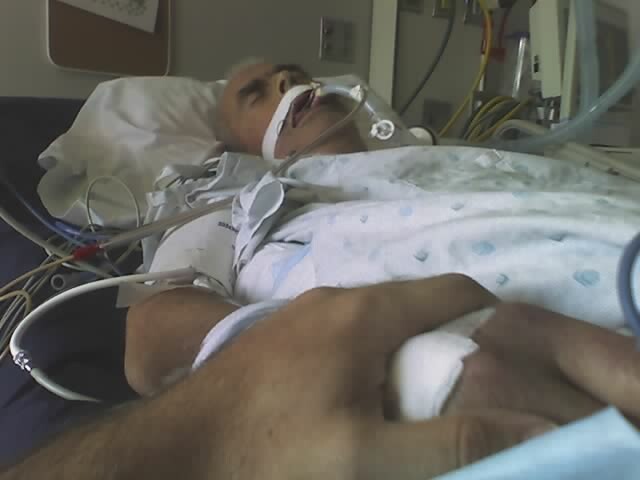“Death From Cancer is the Best”

© 2005 Steve Ganz, Flickr | CC-BY | via Wylio
Dr. Richard Smith, a former editor of the British Medical Journal, wrote recently, “death from cancer is the best.” And I think many of us, if not most of us, would disagree — to one extend or another — with Dr. Smith.
Cancer can create an embarrassment of dependence for it’s dying victim, causing the possibilities of:
Uncontrolled bowel movements,
Intense fatigue
Wasting away (cachexia)
Pain.
And, of course, there’s the equally horrible side effects of chemotherapy and various other cancer treatments:
Nausea and vomiting
Hair loss
And more pain.
So, what in the hell is Dr. Richard Smith talking about? Has he considered how many small caskets cancer has filled? The emotional stress, the exorbitant amount of money spent and the powerless insurance fights? How can an end-of-life that involves so much pain, money, dependence and cachexia be considered a “good death”?
He writes, with a bit of pithiness, about the good death of cancer:
“You can say goodbye, reflect on your life, leave last messages, perhaps visit special places for a last time, listen to favourite pieces of music, read loved poems, and prepare, according to your beliefs, to meet your maker or enjoy eternal oblivion,” he says.
“This is, I recognize, a romantic view of dying, but it is achievable with love, morphine, and whisky. But stay away from overambitious oncologists, and let’s stop wasting billions trying to cure cancer, potentially leaving us to die a much more horrible death.” — Via the BMJ Blog
There’s over 100 different types of cancer and not all cancers are equal; some are are much more deadly and others more painful. And I hope that Dr. Smith’s statement isn’t a blanket, meant to cover all types and forms. If he is making a blanket statement, he’s wrong.
Yet, I think the other metanarratives of “cancer sucks” and “cancer is the enemy” are equally wrong.
Luis Buñuel writes:
“An even more horrible death is one that’s kept at bay by the miracles of modern medicine, a death that never ends. In the name of Hippocrates, doctors have invented the most exquisite form of torture ever known to man: survival.”
We all know that the word “euthanasia” means “a good death”. The antonym of “euthanasia” is “dysthanasia” which means — you guessed it — “a bad death.” On a more practical level, “dysthanasia” is “generally used when a person is seen to be kept alive artificially in a condition where, otherwise, they cannot survive.” The bad death is a modern, medical induced phenomena where every attempt is made to hold back the inevitable; and yet, as Luis Buneul states, it ends up being an “exquisite form of torture.”
Part of the reason that cancer is often seen as bad death is because of the medical community’s attempt to use nearly every means possible to “cure”. Even when the prognosis is terminal, there seems to this held out hope in the miracle of modern medicine. And so, it’s not necessarily the cancer that is “dysthanasia”, but the treatment of it.
It also seems that our hatred towards cancer death is caused by framing cancer in a war narrative, where cancer is seen as “the enemy.” There are some problems when we frame cancer using a war narrative.
In earlier research, investigators found that war metaphors can lead to feelings of guilt and failure in patients who die of cancer, even though they have little control managing it.
…
Hauser says that medical professionals and media outlets should try to help expand the way that people think about the disease. He cites the “watchful waiting,” a passive method of treating prostate cancer, as one such example.
“What would be more beneficial would be changing the sorts of stories about cancer out there to expose aspects of the disease that don’t fit with this enemy conceptualization,” he says. “Blame is being put on the patient, and there’s almost a sense that, if you are dying, you must have given up and not have fought hard enough,” said the study’s author, Lancaster University professor Elena Semino, in a statement Via TIME
Sometimes — not all the time — cancer IS the good death. To start out with the assumption that cancer IS the enemy may rob us from enjoying the final days of our lives. Sure, there are times when cancer is a horrible death and times when it is the enemy, but not always. Cancer is what it is … it’s one way out of thousands that might pave your path to the inevitable. You will die. I will die. We will all die. And it’s very possible that cancer is a gracious way to end.
While we should hate the fact that cancer causes death (yes, cancer sucks), in terms of comparison and contrast, it’s not the absolute worst way to reach the inevitable. And while it mostly sucks, sometimes it might be the best possible option.
This entry was posted by Caleb Wilde on January 12, 2015 at 8:16 pm, and is filed under Dying Well. Follow any responses to this post through RSS 2.0.You can leave a response or trackback from your own site.
